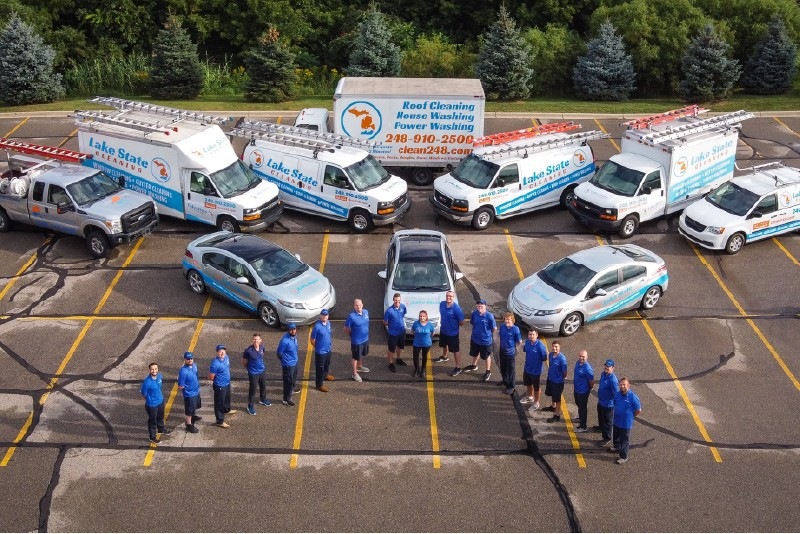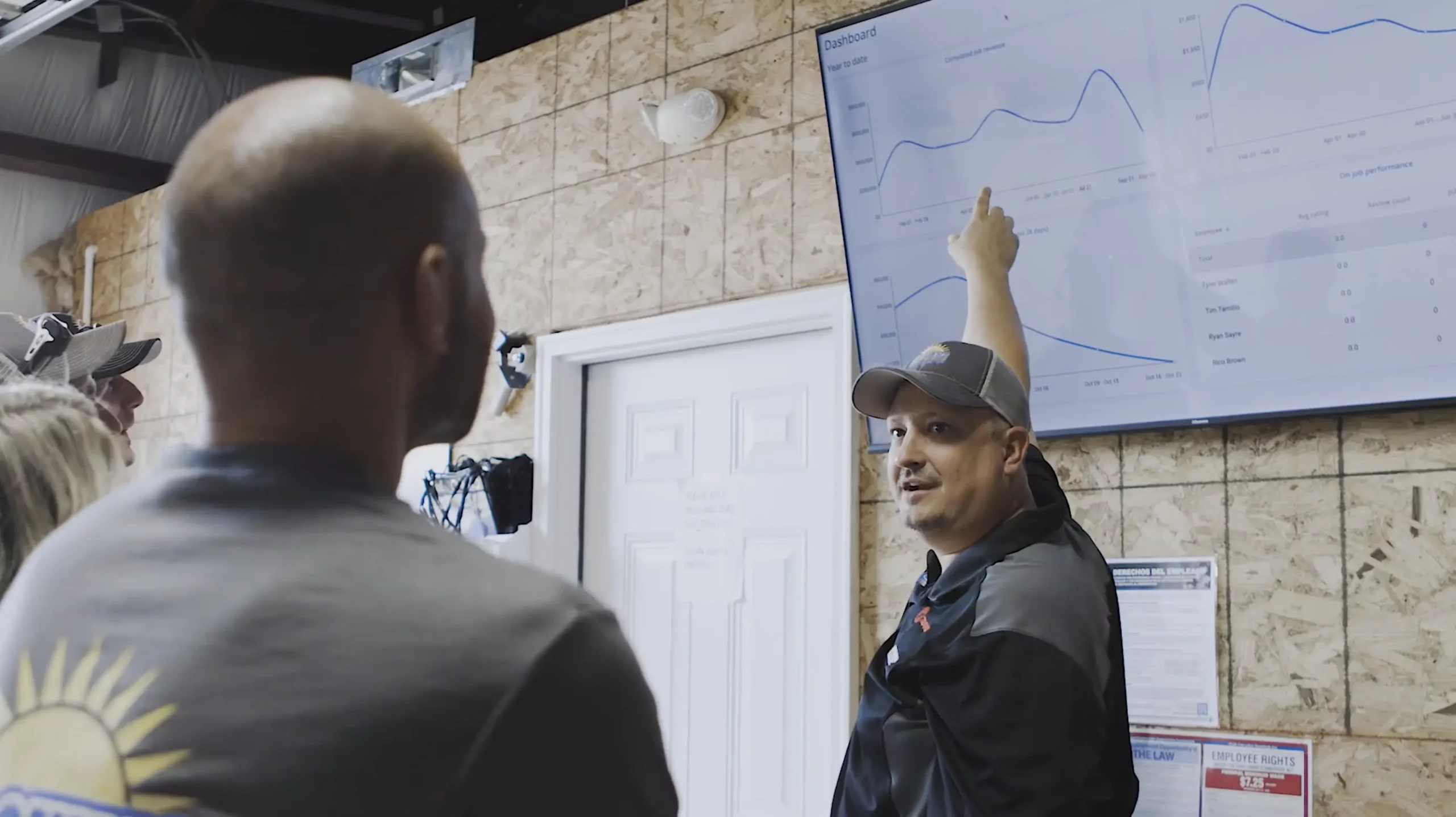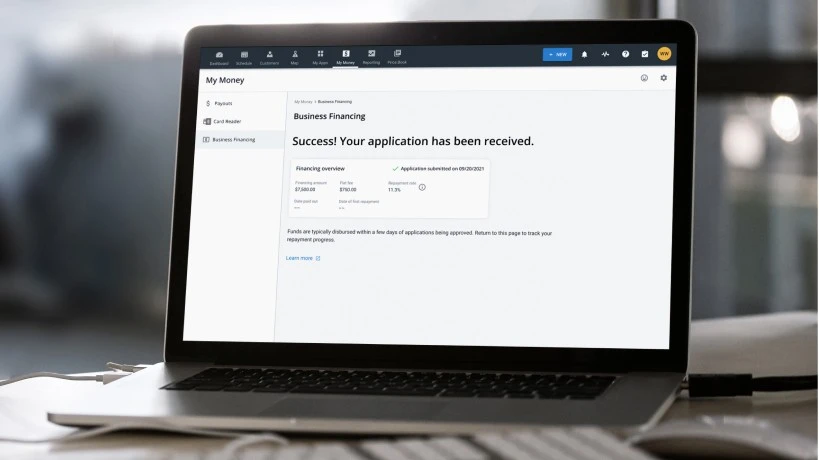
In our experience, people start residential cleaning companies for the flexibility. Whether you’re the primary cleaner or hiring others, you reap the benefits of working for yourself like setting your own rates and your own hours. And with a cleaning business, there are low start-up costs and lots of room to expand.
But it’s not easy. Starting a new business never is.
That’s why we’ve put together this guide to help you understand the basics of starting a cleaning business. We look at the legal requirements, the costs, how to find business leads in your local area, and more. And we use real-life examples of business owners from around the U.S.
Finally, we’ve summarized all the steps you’ll need to take to start your business in a downloadable checklist.
So let’s start with what it costs to start a residential cleaning company.
Fund your cleaning business
A cleaning business doesn’t require too much upfront capital. But like any new business, there are always a few startup costs you need to consider.
How to get started with funding your cleaning business
- Add up your business expenses
- Assess your personal expenses not covered by other income or savings
- Estimate your initial monthly revenue
- Calculate your break-even point
- Set revenue and profit margin goals
- Figure out your business credit score
- Compare financial options for your startup costs
- Write a business plan
Start as lean as possible
Residential cleaning expert Angela Brown recommends spending as little as possible at the beginning — especially if you’re new to the industry. She explains that new owners often come in and spend a ton of money on marketing and branding before even knowing if the industry is right for them.
“The next thing they know is they’re out of business because they spent an inordinate amount of money and they’ve gone in debt and borrowed money from family and friends, and they’re no good at housecleaning. They can’t keep the customers that they get, and thirty days from now, they’re no longer here.”
Instead of borrowing money to get started, once you know that you enjoy the work and would like to continue, Angela recommends starting with only the basic supplies that you need and beginning to save money from each job to save up for more supplies and marketing resources.
Check out her free ebook: How to Start Your Own House Cleaning Company: Go from startup to payday in one week to learn more.
Register your cleaning business
To run your own business, you’ll need to register your business on the federal, state and local levels, including registering for a tax ID. You’ll need this ID to open a business banking account and get insured. If you’re not sure how to register, you can work with a registered agent.
How to register your business:
- Make sure you have all the licenses you need
- Incorporate and register your business
- Apply for a tax ID
- Open business bank account
- Apply for insurance and bonding
- Set terms of service
Do you need insurance?
The short answer is yes. When it comes to cleaning, accidents happen. It’s inevitable that, at some point, you’ll scratch a piece of furniture or floor, or break a dish. Insurance helps protect you when these events occur.
The other item to consider is a “Terms of Service” document that users must follow if they accept your services. They act as a legally binding contract between you and your clients. If you don’t know where to start, you can have a look at free cleaning terms and conditions templates available online.
Manage your cleaning business operations
Running a cleaning company requires the management of customer, employee, and financial information. It’s this technical side that slows down many new cleaning companies. But the right tools help immensely. To help you out, we’ll give you an overview of the technical aspects you need to have ready.
Steps
- Set up a website and social media profiles
- Shop for and invest in tech platforms (see chart)
- Create calls-to-action (CTAs) on your website and social media profiles
Software tools checklist
Here’s a breakdown of the different kinds of tech platforms you should consider investing in.
| Area of focus | Purpose | Brand example |
|---|---|---|
| Social media management | Schedule and automatically send posts; respond to messages across social media platforms in one place. | Hootsuite |
| Email marketing manager | Manage email campaigns. | MailChimp |
| Customer relationship management | Track customer leads, maintain detailed customer histories. | Insightly |
| Field service management | Online booking & scheduling, job management, invoicing, and payment processing. | Housecall Pro |
| Payroll and accounting management | Manage employee paychecks, expenses, and taxes. | Paychex |
Case study: Market residential services
Melissa Arvizu, cofounder of Arvizu Commercial Cleaning, gained forty new clients in just three months when she added residential services. She credits her quick success to having the right technology.
For Melissa, the following features were important:
- The ability to text her clients details about their upcoming cleaning and notify them when a technician was on their way.
- Offer her technicians easy access to all job details from wherever they are.
When you’re evaluating different technology, we recommend:
- Looking for solutions that are popular with others in your industry
- Talking to your customers or potential customers to know what’s important to them
Get cleaning business supplies
Compared to other industries, the supplies needed to run a residential cleaning company are much simpler, but they’re also an essential part of the success of your business.
How to make sure you have the right cleaning supplies
- Assess your supplies inventory
- Shop around for wholesale prices on all supplies
- Consider uniforms for all your cleaning techs
Choosing the right supplies
Choosing the best cleaning products is your area of expertise. But you’ll need to balance cost and performance. On her podcast Ask a House Cleaner, Angela Brown often reviews and compares products for house cleaning specialists. Check it out to keep up-to-date on the best products out there.
For instance, check out this episode on Angela Brown’s Top 10 Personal Protective Equipment like gloves, masks, and safety glasses.
Choose your market and audience
Instead of advertising general cleaning services, you can find a common market and offer specialized services.
How to choose your target market and audience
- Outline your target market and ideal customer
- Decide if you want to specialize
- Update your brand messaging and service offerings accordingly
Who is your target customer?
On his Grow My Cleaning Company Podcast, Mike Campion explains, “We’ve got to shift from ‘If I’m getting customers, I’m successful,’ … to ‘Getting the right customers and serving them — that’s a big part of my success.’ And the problem is, if you don’t know who the right customers are, you can never create a system that attracts them.”
When it comes to targeting common markets, you need to understand what their needs and values are. You should talk to your target market and see what they expect in a good cleaning business and how much they’re willing to pay. Remember to craft your sales pitch and brand around solving their problems.
Should you concentrate on homeowners?
While homeowners are the biggest consumers of residential cleaning services, but there are other groups of people you could target, such as:
- Airbnb hosts: Airbnb, the online marketplace for homestays, is an excellent opportunity for new residential cleaning services. You can offer cleaning services to help Airbnb hosts keel their rental space clean and tidy.
- Real Estate Agents and Property Managers: Realtors generally need a list of professionals that can assist with properties before pictures and after a sale. And property managers always have need for cleaners.
Case study: Targeting realtors
A Green Way Home Cleaning works with realtors to deep clean homes before they’re available on the market.
How do they partner with realtors? “You’ve got to go to all the meetings. You’ve got to go door-to-door. You have to invest your time in it. About once a week or twice a week, I go to some sort of event where there are real estate agents, and they don’t necessarily want me to be there, but they understand it’s the way that it is,” Destiny Ferguson, owner of Green Way, explained.
What does their sales pitch look like? “On average it takes somebody four hours to clean approximately a thousand square feet of living space when they’re moving and moving out or showing a house. And when you’re moving and selling, it’s a lot of stress to deep clean a place. So we offer them peace of mind and time so that they can just move in and unpack and be done with it. Also, we know that if we clean the house, it’s going to sell fast … We can get in there and get it done and get pictures taken before the open house.”
Do you want to specialize?
In that same episode, Mike explained that customers aren’t looking for a company that does everything; they’re looking for a company that offers specifically what they need. “You’re customers are not going to be impressed at all the things that you know, they’re just going to think that you don’t understand them … the more specific you can be the more impressed your customers will be that you understand them.”
Part of selling to a specific audience can involve specializing or choosing a niche. This could be something like green cleaning or homes with pets. Or it could be specializing in the best move in/move out deep cleans.
While specializing or choosing a niche isn’t necessary, it can be helpful in targeting a specific audience and charging better rates.
Case study: Region-specific branding
Your branding should be centered around attracting your target market. If you’ve decided to focus on a specific specialty or niche, or targeting AirBnb hosts or realtors, your branding should reflect this.
Your branding includes how you stand out in print materials, on your website, social media platforms, review sites, and anywhere else people will find your business name and logo.
Oranges and Lemons is a residential cleaning company located in Downtown Los Angeles (DTLA). According to co-owner Melanie Garcia, DTLA is a small area (encompassing about two miles) which has a small town feel. It’s become a heavily residential area with owner-occupied lofts and live/work spaces.
Their branding and services were designed to appeal to DTLA residents. Their website is packed with references to the area and loft owners.
When they were getting started, instead of going more modern routes like Google AdWords or Facebook ads, they took out ads on local blogs that offered area news and reviews, as well as advertised in the neighborhood’s main grocery store.
According to Melanie, this strategy worked well for them and helped establish trust in their area.
Set your services and rates
Many of the business owners we’ve talked to explained that it took them a while to find the “sweet spot” when it came to pricing their services and figuring out what should be included in a cleaning package. You’ll know you’ve hit that sweet spot when you’re both meeting your revenue goals and attracting your ideal customers.
How to set rates for your cleaning business services
- Create a list of services you’re able to or interested in offering
- Create a price list for all of your services
- Create a contract template
- Write up a terms and conditions document
Understand your area’s average prices
For starters, it’s helpful to know the national and regional average prices for a house clean, as well as the hourly rate.
Note: You can charge above your area’s average rate: you just need to be able to justify why your services are above par.
Common beginner issues when setting up rates
Setting Your Prices Too Low
When you start, you may be pricing too low. If this happens, make sure you learn and take your costs into account after every job.
“I learned that my expectations weren’t where they should be … I needed to be paying my employees more so that they weren’t killing themselves and feeling stressed out. And I needed to be charging the clients more. They had higher expectations because we offer more services than other cleaning companies. I didn’t need to be that underdog that I was at the time. I was doing crazy posts like $100 deep cleans for houses that were 4,000 square feet that would take us seven or eight hours.” – Tabitha Velasquez
“I wanted to try to price [my services] high enough that it keeps away the tire kickers: the people who only pay for the cheapest kind of service you can get. I’m not interested in servicing them. You set the prices high enough; you can weed them out as much as you can.” – Scott Foley
Including too much in a standard cleaning
Once you have a better understanding of your rates, you can put together cleaning packages or checklists. You’ll need to know what tasks are time intensive and should be outside the scope of a standard cleaning package.
Pro Tip: Include a detailed list of what goes into your cleaning packages on your website, quotes, or services agreements to make sure that you and your customers are on the same page.
Here are examples of typical cleaning services and what services companies frequently charge extra for:
| Common for a typical clean | Frequently costs extra to clean |
|---|---|
| Dusting baseboards | Inside the stove, fridge, or microwave |
| Dusting ceiling fans | Cleaning inside cabinets |
| Vacuuming and mopping | Floor scrubbing |
| Toilet cleaning | Washing the dishes or doing the laundry |
| Wipe down & disinfect sinks/countertops/tubs | Window washing |
| Exteriors of cabinets and appliances | |
| Washing mirrors | |
| Taking out the trash | |
| Changing the bed linens |
Here are examples of typical cleaning packages many businesses advertise and what companies promote as specialty cleaning packages for their customers:
| Common cleaning packages | Specialty cleaning packages |
|---|---|
| Move-in/move-out | Flu prevention |
| Deep clean | Allergy cleaning |
| Green clean | Post-construction cleaning |
| Wipe down & disinfect sinks/countertops/tubs | Window washing |
Advertising your cleaning business
When it comes to advertising, there’s no one perfect strategy. What works well can vary based on your location, your target customer, specialization, and simply what you’re good at. But before you spend tons of money on advertising, we recommend building up your online presence and in-person networking. These strategies can save you money in the long-run and help you find organic leads.
How to market and advertise your cleaning company
- Create a marketing plan
- Design business cards, wrap your vehicles, and make leave-behind flyers
- Sign up for Google My Business
- Claim your business on other lead generation platforms
- Optimize your website for search engines (SEO)
- Join digital and in-person networking groups
Three approaches to successfully market cleaning companies
We’ve talked to many cleaning business professionals and they’ve shared with us their success on a variety of online channels.
1. The Google Approach
Scott Foley, the founder of Maid 2 Clean, tried every advertising approach in the beginning.
- Posted on Facebook Groups
- Ran Facebook Ads
- Built-up his Yelp Reviews
- Advertised via Home Advisor
- Posted on Google Ads
From all these approaches, he found that Google Ads worked best.
How Scott Did it: Scott began by creating Google ads himself. He, however, saw better results after he worked with a digital advertising agency.
The Challenge: The biggest challenge for Google Ads is cash flow. You need revenue to run ads continually. It’s not the cheapest advertising tactic, to begin with. But once you have revenue and predictable cash flow, it’s excellent at bringing leads and customers through the door.
2. The Social Approach
When Tabitha Velasquez, started her cleaning business, Great American Cleaning, everything was new to her. But luckily, she knew how to use Facebook, so that’s where she started. She found local Facebook groups such as groups for moms in the area and began announcing her new business, offering members a discount to try out her services. According to Tabitha, almost all of her business came from social media.
How Tabitha Did it: Great American Cleaning has many active profiles on social media pages like Instagram and Facebook. Tabitha has a virtual assistant that spends approximately four hours a day on social media, creating posts, responding to comments, and messages.
Tabitha’s Tools: She uses Canva and Ripl to create images and videos, and Trello to coordinate her social media posting schedule.
3. The Yelp Approach
Jessalyn Smith, the co-founder of Lemon and Lavender uses many avenues to advertise and market her services. These include brochures, business cards, a Facebook Page, and company information on her car. She’s also received return clients from each but estimates that 85% of her business comes from Yelp, a crowd-sourced business review forum, and directory.
The Challenges: Jessalyn hasn’t had to work very hard to get reviews. Her clients have been happy with her service and left positive reviews without being asked. Jessalyn, however, began to ask customers to re-review when she noticed that new reviews were not showing up on the site. When one customer called and complained, Yelp reposted the review. Since then, Yelp has begun displaying new reviews.
Yelp will penalize businesses if it believes you are soliciting reviews from your customers. It will either demote the review or the business’ overall Yelp ranking. It is generally done through a search engine and can erroneously penalize companies that involve their customers.
The Positives: More customers are looking online when it comes to reviews (from Yelp, Google, Facebook, etc.) to shop for local businesses. 91% of people read online reviews, while 84% trust them as much as a personal recommendation. Review sites like Yelp also provide an interface for businesses to interact with customers and even encourage online bookings.
With Housecall Pro, customers can book online via Yelp, Facebook, and Instagram without navigating to an external booking page.
Hiring for your cleaning business
For nearly every cleaning business owner we’ve talked to, maintaining quality cleaning technicians is their biggest stumbling block. Learn from these cleaning business experts about how they find and keep good workers.
How to find employees for your cleaning business
- Assess the numbers (what can you afford?)
- Research the legal requirements (federal, state, and local) of hiring someone
- Outline the hiring and onboarding processes
- Set up functions to handle salary and benefits
- Create job listing ad
Marketing tips from cleaning companies owners
Advertise on Facebook
“There are lots of local hire pages, and I also advertise on my Facebook page for my business. Facebook now allows you to accept resumes. We constantly have an open post for accepting new employees. And then, once a month, I’ll put out posts on all of the social media platforms, but Facebook is where they mostly come from — specifically all the local hiring pages. I post in English and Spanish because I’m bilingual, and it works to have bilingual cleaners. I put the posts out, and we’ll do an open interview once a month on a Saturday.” Tabitha Velasquez, Great American Cleaning
Always be hiring
“There’s always somebody you have to replace, and it is a whole separate side of the business. You’ve got the customer service side and the employee service side. You want to give your employees the best working environment possible: the best bonuses, things forward to so that they don’t just call in sick the next day or they don’t just leave and go to another cleaning company. You can work at Subway and make $15 an hour. It’s very hard to compete against that in this kind of job. So make them happy. And even still, you should be in interviews every week. You should be training every week. You should always be looking to replace your weakest link.” Destiny Ferguson
Invest in your staff
Emma and Melanie Garcia are a mother/daughter team behind Oranges and Lemons cleaning company in Downtown Los Angeles. They manage a happy staff of eighteen people and are the biggest allies for their team. Here’s how they invest in their employees:
- The Garcias pay each of their employees’ $5 monthly membership fees to the National Domestic Workers Alliance, which provides a $5,000 life insurance policy and job training opportunities.
- They provide safety training programs for their staff to ensure they don’t get hurt on the job.
- They provide paid time off for holidays so that their employees can rest and enjoy time with their families.
What to do with your company next
You’re not alone if you find the process of starting a new business overwhelming. And this is exactly why community is so important. Check out our local meetups and full day Mastermind events to network and learn from other service businesses.
There’s also the Association of Residential Cleaning Services International (ARCSI) and the National Domestic Workers Alliance.
For general business resources, we recommend:
- The US Small Business Administration (SBA)
- SCORE
- Entrepreneurs’ Organization
- National Small Business Association (NSBA)
- National Association for the Self-Employed
Check out a longer list of small business associations.
Finally, don’t forget to download the ‘How to Start a Residential Cleaning Business Checklist’ — a summary of all of the steps we went over in this guide.






